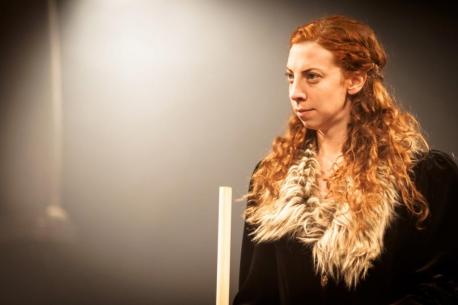William Shakespeare
Directed by Ricky Dukes
★★★
Pros: Flashes of real quality and originality in the staging.
Cons: Certain aspects of the staging didn’t quite work.
Our Verdict: A hit and miss production which was admirable in its risk-taking and ingenuity. It had a nice pace but fell flat on a few occasions.
 |
| Courtesy of Greenwich theatre |
Like many of my contemporaries, I studied Lear for A-Level. I remember my English teacher would
turn up to class seemingly drunk – shirt untucked, glasses askew, shoelaces untied – and then proceed to stick on any Lear-related DVD he’d managed to get his hands on the evening before. We saw Lear in Russian, Lear in black and white, Lear in Russian and black and white – all the while allowing my teacher to rest his poor, woozy head. But of all the versions I saw, I never saw Lear as a woman.
This production, presented by the Lazarus Theatre Company, did just that. The unusual gender reassignment was played by Jennifer Shakesby – any dubious suspicions of ancestral nepotism disappeared at the confident way she began the first scene. Even more strikingly, she had a stream of long wavy red hair that immediately put me in mind of former Sun editor Rebecca Brooks: this was a woman with balls.
But this is also where some of the problems started. There was a weird inconsistency in the revised dialogue: Lear would refer to herself as a ‘woman’, and the sisters called her ‘mother’, but then she was still ‘King’ and ‘My Lord’ to others. Shakespeare coined many terms, but I don’t think ‘trans-curious’ was one of them… It gave the feeling that there was no particular reason to cast Lear as a woman – indeed, Shakesby didn’t act very womanly, there was no dampening of Lear’s traditional brutish nature, nor any extra tension that is often accentuated between daughter and mother as opposed to father. It seemed like a missed opportunity to put a new spin on the characters’ relationships.
This was a pattern throughout the production: hitting you with something fresh and unique but not quite putting in enough care and attention to make it work in its entirety. For example, the staging was at times exhilarating: bursts of energy accompanied by terrifying abstract music then sudden sparse stillness. It was very effective. But then sometimes the music was painfully loud and the frenzied action over the top (one random character died by dramatically spitting his last breath into the air – if any of you have seen the Nicholas Cage ‘classic’ The Rock, you might too have been reminded of a rather silly death scene).
The set was pretty much completely bare, except for a circular raised section and a few chairs that cropped up now and then. This, however, didn’t matter at all, as much of the lighting appeared as long streaks from the side. Most of the time you could only see the actors’ faces peering through the atmospheric dry ice that wafted around the theatre. It looked great – very filmic as your eyes were drawn directly to the action. There was even an intriguing bit where some of the minor cast members wore torches on their heads, and were the only source of light in that scene: when they moved, the whole atmosphere shifted. It was like Christmas lights. But human-powered. And not rubbish.
Again, though, the experimental approach to lighting became at times a hindrance: often the characters would be ever so slightly out of the light, just like government whistleblowers on Panorama. And because the lights were fixed in position and hidden in the wings, much of the action took place towards the back of the stage – the big chasm of blank space between us and them left everything slightly disconnected.
This was my overall feeling: disconnection. I remember the last time I saw Lear at the theatre. Lear had Cordelia in his arms, and was delivering a heartfelt speech. I had seats very close to the front, and there was one moment where Lear spoke so forcefully, that he gobbed directly in Cordelia’s face. I was a teenager at the time, but I didn’t snigger: I was completely caught up in the moment. After having seen Lear so many times in class, it was the first time I truly appreciated the power of the story. And although I enjoyed Lazarus’ version, and would recommend a watch, to me it just felt like another one of those DVDs.
Please feel free to leave your thoughts and opinions in the comments section below!
Lear runs at Greenwich Theatre until 1st June 2013
Box Office: 0208 858 7755 or book online at: http://www.greenwichtheatre.org.uk
 Everything Theatre Reviews, interviews and news for theatre lovers, London and beyond
Everything Theatre Reviews, interviews and news for theatre lovers, London and beyond


